Ethical Considerations: Ensuring an Ethical Approach to Research
VerifiedAdded on 2023/06/08
|6
|1221
|431
Essay
AI Summary
This essay delves into the crucial actions researchers must undertake to ensure an ethical approach to research participants, aligning with established ethical principles. It highlights beneficence, non-maleficence, respect for persons, and justice as cornerstones of ethical research. The essay underscores the significance of values such as integrity, respect, objectivity, research merit, confidentiality, and justice in fostering trust and moral equality between researchers and participants. Special attention is given to maintaining confidentiality and anonymity, emphasizing the importance of safeguarding sensitive information and employing unique coding methods to protect participants' identities. Furthermore, the essay advocates for objectivity in data interpretation and experimental design, urging researchers to be transparent about potential benefits and impacts on participants. By adhering to these ethical guidelines, researchers can uphold the integrity of their work and ensure the well-being of those involved in their studies. Desklib offers a wealth of resources, including similar essays and solved assignments, to aid students in their academic pursuits.
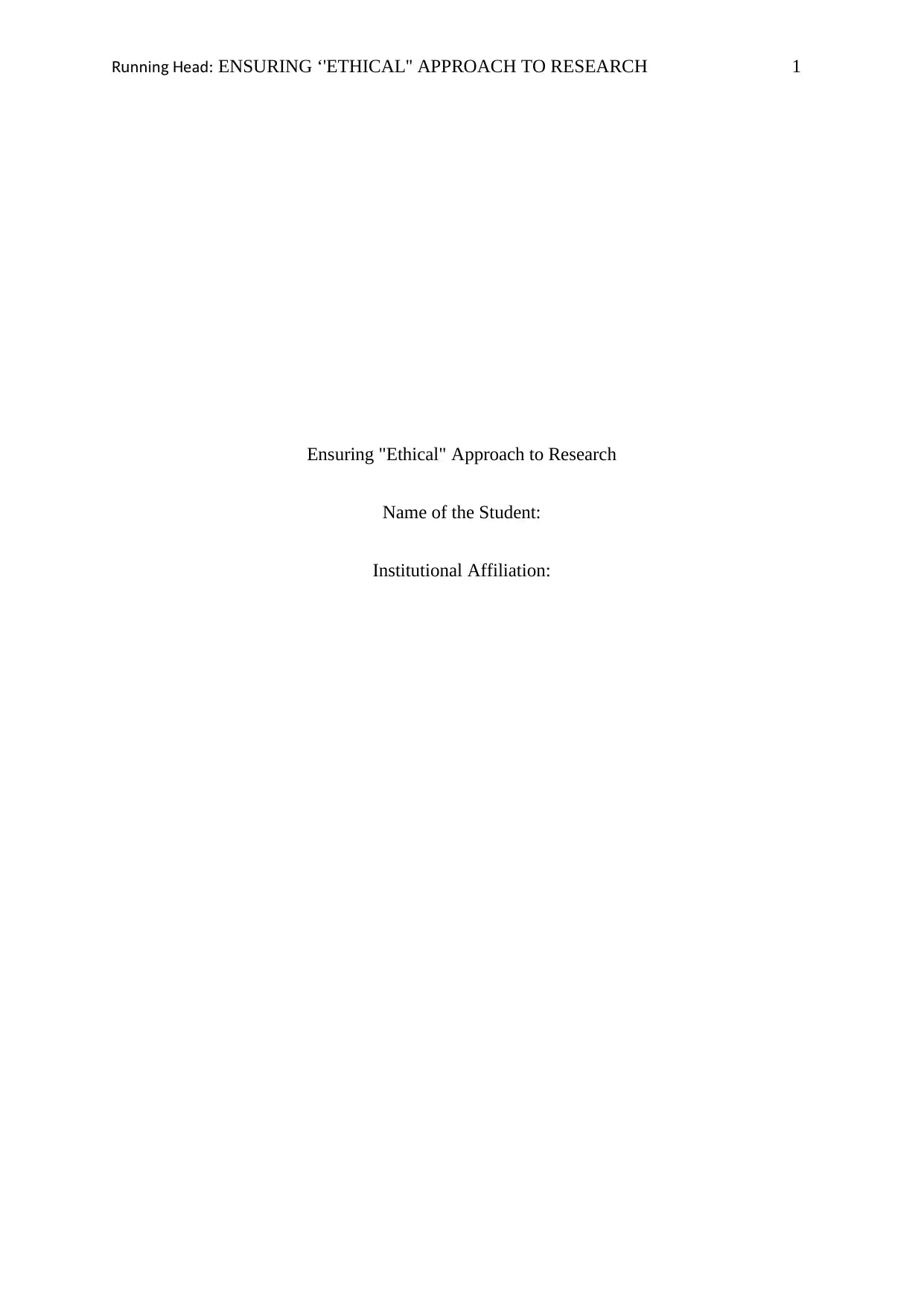
nnin eadRu g H : ENSURING ‘'ETHICAL'' APPROACH TO RESEARCH 1
Ensuring "Ethical" Approach to Research
Name of the Student:
Institutional Affiliation:
Ensuring "Ethical" Approach to Research
Name of the Student:
Institutional Affiliation:
Paraphrase This Document
Need a fresh take? Get an instant paraphrase of this document with our AI Paraphraser
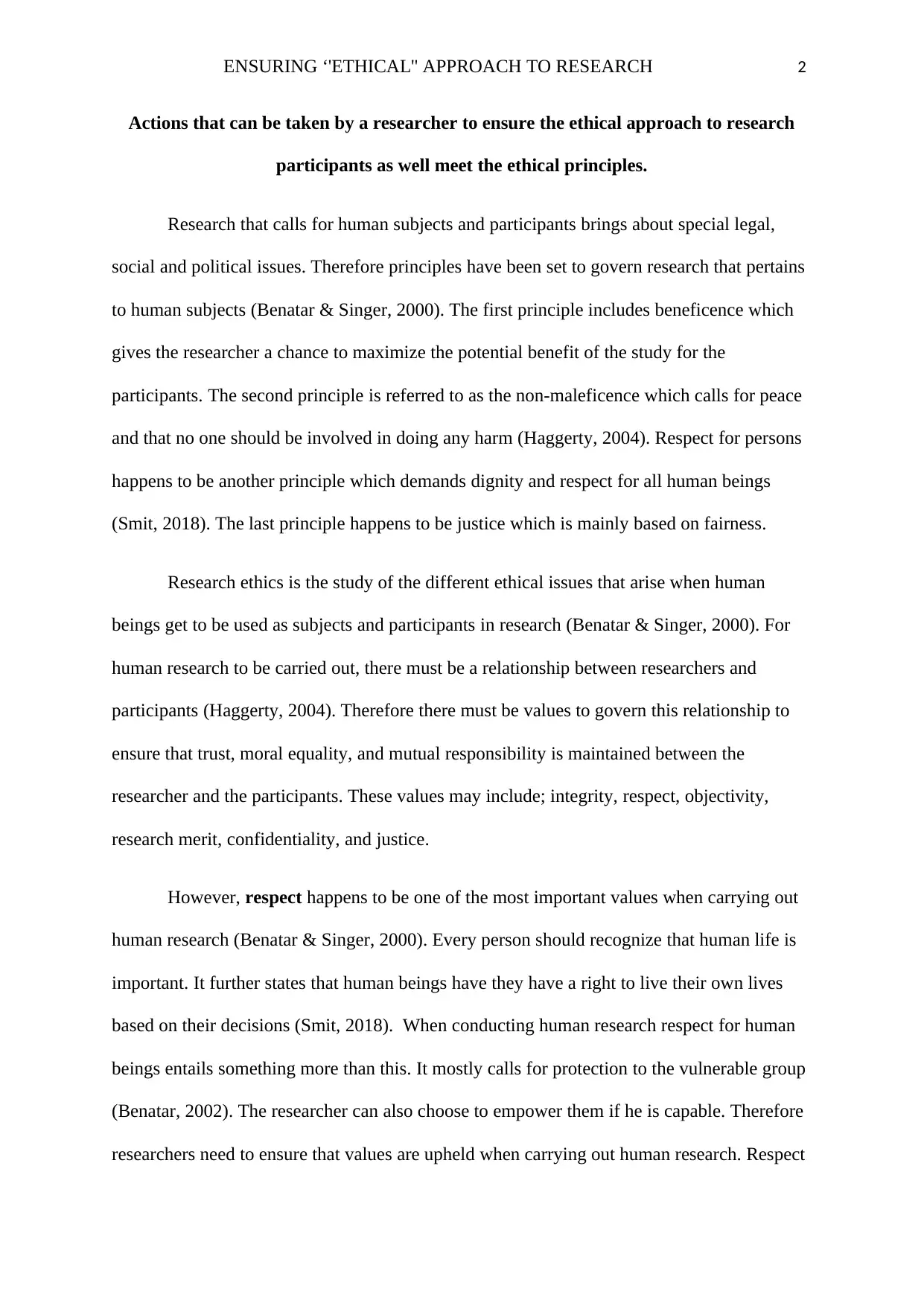
ENSURING ‘'ETHICAL'' APPROACH TO RESEARCH 2
Actions that can be taken by a researcher to ensure the ethical approach to research
participants as well meet the ethical principles.
Research that calls for human subjects and participants brings about special legal,
social and political issues. Therefore principles have been set to govern research that pertains
to human subjects (Benatar & Singer, 2000). The first principle includes beneficence which
gives the researcher a chance to maximize the potential benefit of the study for the
participants. The second principle is referred to as the non-maleficence which calls for peace
and that no one should be involved in doing any harm (Haggerty, 2004). Respect for persons
happens to be another principle which demands dignity and respect for all human beings
(Smit, 2018). The last principle happens to be justice which is mainly based on fairness.
Research ethics is the study of the different ethical issues that arise when human
beings get to be used as subjects and participants in research (Benatar & Singer, 2000). For
human research to be carried out, there must be a relationship between researchers and
participants (Haggerty, 2004). Therefore there must be values to govern this relationship to
ensure that trust, moral equality, and mutual responsibility is maintained between the
researcher and the participants. These values may include; integrity, respect, objectivity,
research merit, confidentiality, and justice.
However, respect happens to be one of the most important values when carrying out
human research (Benatar & Singer, 2000). Every person should recognize that human life is
important. It further states that human beings have they have a right to live their own lives
based on their decisions (Smit, 2018). When conducting human research respect for human
beings entails something more than this. It mostly calls for protection to the vulnerable group
(Benatar, 2002). The researcher can also choose to empower them if he is capable. Therefore
researchers need to ensure that values are upheld when carrying out human research. Respect
Actions that can be taken by a researcher to ensure the ethical approach to research
participants as well meet the ethical principles.
Research that calls for human subjects and participants brings about special legal,
social and political issues. Therefore principles have been set to govern research that pertains
to human subjects (Benatar & Singer, 2000). The first principle includes beneficence which
gives the researcher a chance to maximize the potential benefit of the study for the
participants. The second principle is referred to as the non-maleficence which calls for peace
and that no one should be involved in doing any harm (Haggerty, 2004). Respect for persons
happens to be another principle which demands dignity and respect for all human beings
(Smit, 2018). The last principle happens to be justice which is mainly based on fairness.
Research ethics is the study of the different ethical issues that arise when human
beings get to be used as subjects and participants in research (Benatar & Singer, 2000). For
human research to be carried out, there must be a relationship between researchers and
participants (Haggerty, 2004). Therefore there must be values to govern this relationship to
ensure that trust, moral equality, and mutual responsibility is maintained between the
researcher and the participants. These values may include; integrity, respect, objectivity,
research merit, confidentiality, and justice.
However, respect happens to be one of the most important values when carrying out
human research (Benatar & Singer, 2000). Every person should recognize that human life is
important. It further states that human beings have they have a right to live their own lives
based on their decisions (Smit, 2018). When conducting human research respect for human
beings entails something more than this. It mostly calls for protection to the vulnerable group
(Benatar, 2002). The researcher can also choose to empower them if he is capable. Therefore
researchers need to ensure that values are upheld when carrying out human research. Respect
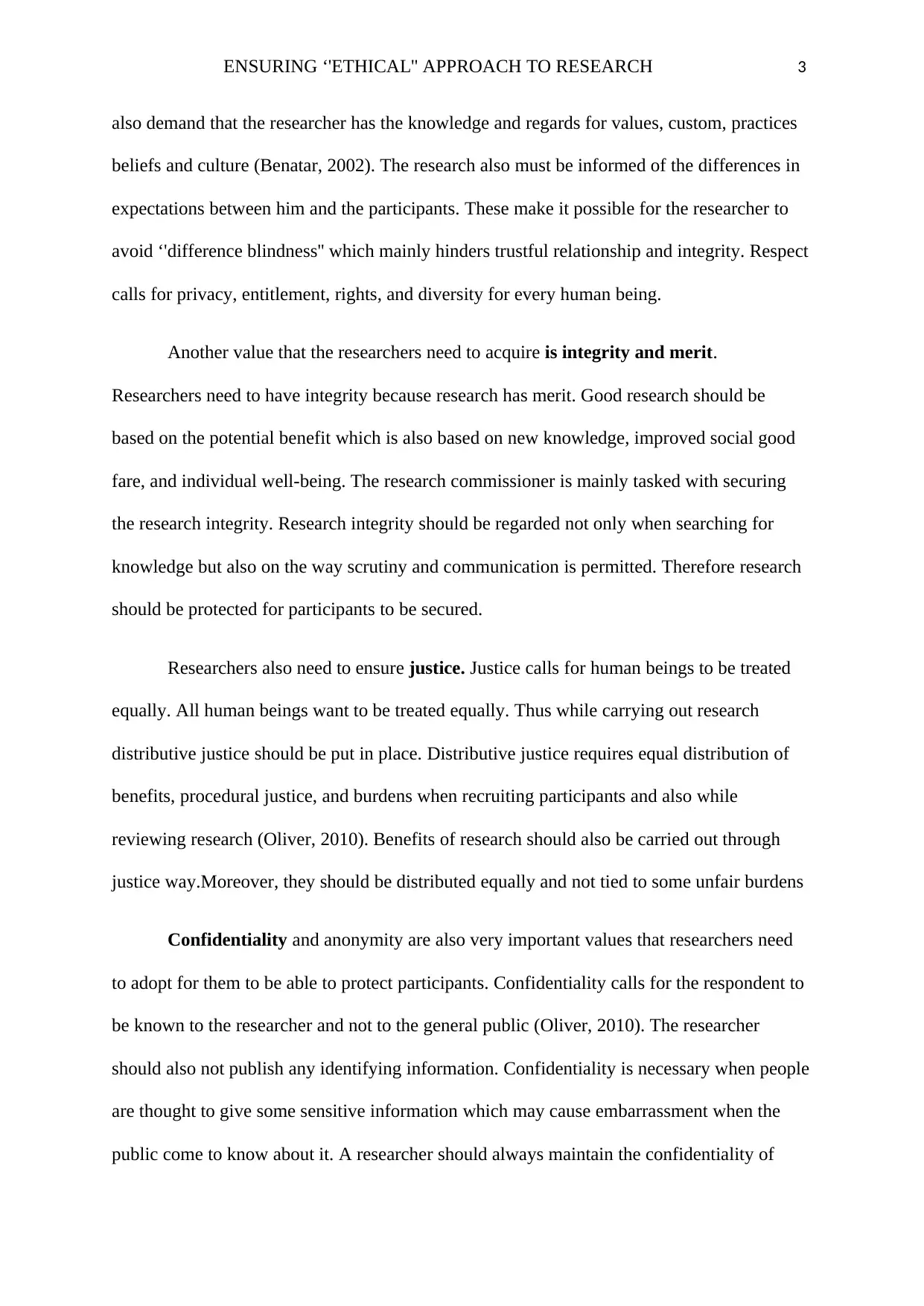
ENSURING ‘'ETHICAL'' APPROACH TO RESEARCH 3
also demand that the researcher has the knowledge and regards for values, custom, practices
beliefs and culture (Benatar, 2002). The research also must be informed of the differences in
expectations between him and the participants. These make it possible for the researcher to
avoid ‘'difference blindness'' which mainly hinders trustful relationship and integrity. Respect
calls for privacy, entitlement, rights, and diversity for every human being.
Another value that the researchers need to acquire is integrity and merit.
Researchers need to have integrity because research has merit. Good research should be
based on the potential benefit which is also based on new knowledge, improved social good
fare, and individual well-being. The research commissioner is mainly tasked with securing
the research integrity. Research integrity should be regarded not only when searching for
knowledge but also on the way scrutiny and communication is permitted. Therefore research
should be protected for participants to be secured.
Researchers also need to ensure justice. Justice calls for human beings to be treated
equally. All human beings want to be treated equally. Thus while carrying out research
distributive justice should be put in place. Distributive justice requires equal distribution of
benefits, procedural justice, and burdens when recruiting participants and also while
reviewing research (Oliver, 2010). Benefits of research should also be carried out through
justice way.Moreover, they should be distributed equally and not tied to some unfair burdens
Confidentiality and anonymity are also very important values that researchers need
to adopt for them to be able to protect participants. Confidentiality calls for the respondent to
be known to the researcher and not to the general public (Oliver, 2010). The researcher
should also not publish any identifying information. Confidentiality is necessary when people
are thought to give some sensitive information which may cause embarrassment when the
public come to know about it. A researcher should always maintain the confidentiality of
also demand that the researcher has the knowledge and regards for values, custom, practices
beliefs and culture (Benatar, 2002). The research also must be informed of the differences in
expectations between him and the participants. These make it possible for the researcher to
avoid ‘'difference blindness'' which mainly hinders trustful relationship and integrity. Respect
calls for privacy, entitlement, rights, and diversity for every human being.
Another value that the researchers need to acquire is integrity and merit.
Researchers need to have integrity because research has merit. Good research should be
based on the potential benefit which is also based on new knowledge, improved social good
fare, and individual well-being. The research commissioner is mainly tasked with securing
the research integrity. Research integrity should be regarded not only when searching for
knowledge but also on the way scrutiny and communication is permitted. Therefore research
should be protected for participants to be secured.
Researchers also need to ensure justice. Justice calls for human beings to be treated
equally. All human beings want to be treated equally. Thus while carrying out research
distributive justice should be put in place. Distributive justice requires equal distribution of
benefits, procedural justice, and burdens when recruiting participants and also while
reviewing research (Oliver, 2010). Benefits of research should also be carried out through
justice way.Moreover, they should be distributed equally and not tied to some unfair burdens
Confidentiality and anonymity are also very important values that researchers need
to adopt for them to be able to protect participants. Confidentiality calls for the respondent to
be known to the researcher and not to the general public (Oliver, 2010). The researcher
should also not publish any identifying information. Confidentiality is necessary when people
are thought to give some sensitive information which may cause embarrassment when the
public come to know about it. A researcher should always maintain the confidentiality of
⊘ This is a preview!⊘
Do you want full access?
Subscribe today to unlock all pages.

Trusted by 1+ million students worldwide
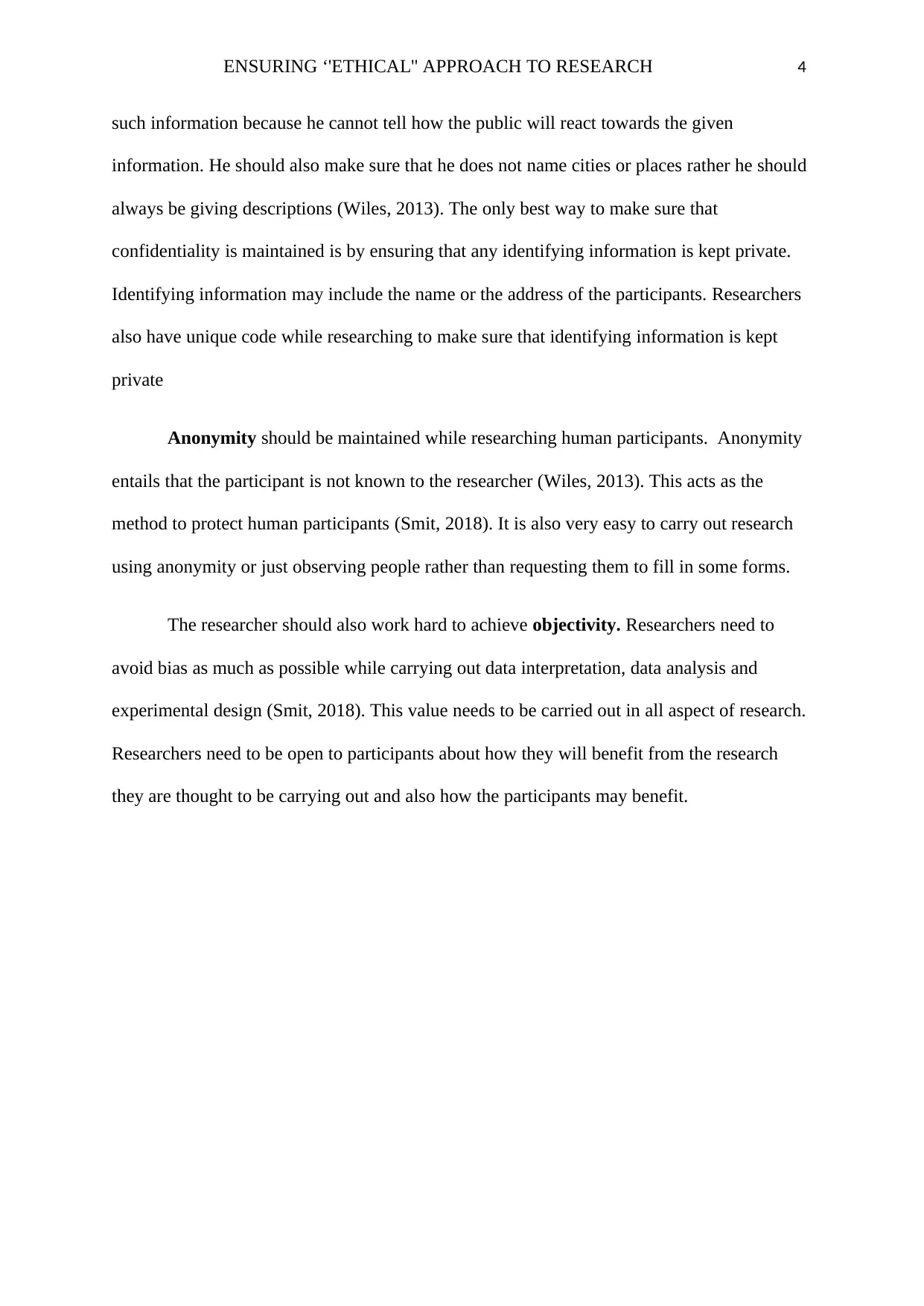
ENSURING ‘'ETHICAL'' APPROACH TO RESEARCH 4
such information because he cannot tell how the public will react towards the given
information. He should also make sure that he does not name cities or places rather he should
always be giving descriptions (Wiles, 2013). The only best way to make sure that
confidentiality is maintained is by ensuring that any identifying information is kept private.
Identifying information may include the name or the address of the participants. Researchers
also have unique code while researching to make sure that identifying information is kept
private
Anonymity should be maintained while researching human participants. Anonymity
entails that the participant is not known to the researcher (Wiles, 2013). This acts as the
method to protect human participants (Smit, 2018). It is also very easy to carry out research
using anonymity or just observing people rather than requesting them to fill in some forms.
The researcher should also work hard to achieve objectivity. Researchers need to
avoid bias as much as possible while carrying out data interpretation, data analysis and
experimental design (Smit, 2018). This value needs to be carried out in all aspect of research.
Researchers need to be open to participants about how they will benefit from the research
they are thought to be carrying out and also how the participants may benefit.
such information because he cannot tell how the public will react towards the given
information. He should also make sure that he does not name cities or places rather he should
always be giving descriptions (Wiles, 2013). The only best way to make sure that
confidentiality is maintained is by ensuring that any identifying information is kept private.
Identifying information may include the name or the address of the participants. Researchers
also have unique code while researching to make sure that identifying information is kept
private
Anonymity should be maintained while researching human participants. Anonymity
entails that the participant is not known to the researcher (Wiles, 2013). This acts as the
method to protect human participants (Smit, 2018). It is also very easy to carry out research
using anonymity or just observing people rather than requesting them to fill in some forms.
The researcher should also work hard to achieve objectivity. Researchers need to
avoid bias as much as possible while carrying out data interpretation, data analysis and
experimental design (Smit, 2018). This value needs to be carried out in all aspect of research.
Researchers need to be open to participants about how they will benefit from the research
they are thought to be carrying out and also how the participants may benefit.
Paraphrase This Document
Need a fresh take? Get an instant paraphrase of this document with our AI Paraphraser
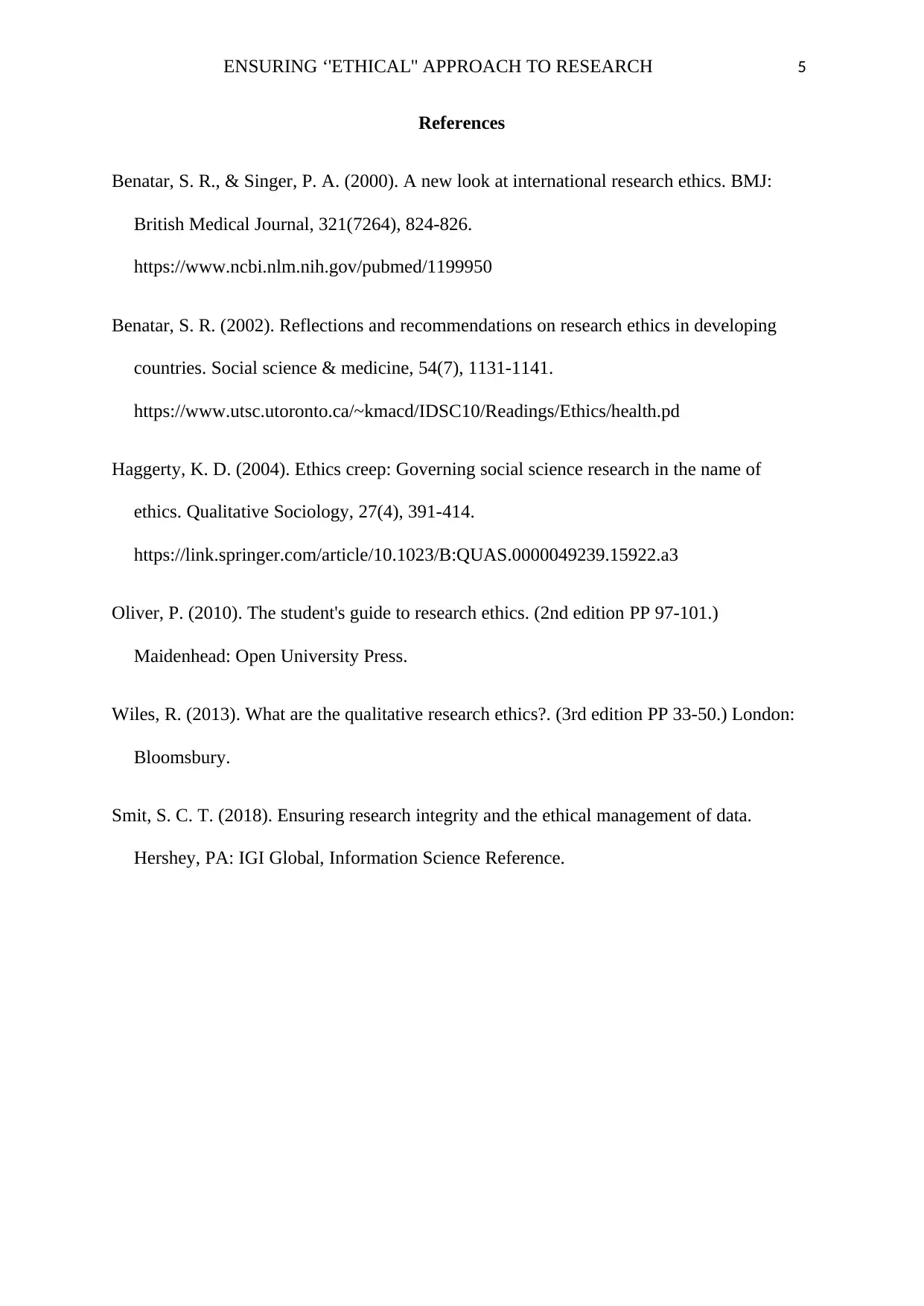
ENSURING ‘'ETHICAL'' APPROACH TO RESEARCH 5
References
Benatar, S. R., & Singer, P. A. (2000). A new look at international research ethics. BMJ:
British Medical Journal, 321(7264), 824-826.
https://www.ncbi.nlm.nih.gov/pubmed/1199950
Benatar, S. R. (2002). Reflections and recommendations on research ethics in developing
countries. Social science & medicine, 54(7), 1131-1141.
https://www.utsc.utoronto.ca/~kmacd/IDSC10/Readings/Ethics/health.pd
Haggerty, K. D. (2004). Ethics creep: Governing social science research in the name of
ethics. Qualitative Sociology, 27(4), 391-414.
https://link.springer.com/article/10.1023/B:QUAS.0000049239.15922.a3
Oliver, P. (2010). The student's guide to research ethics. (2nd edition PP 97-101.)
Maidenhead: Open University Press.
Wiles, R. (2013). What are the qualitative research ethics?. (3rd edition PP 33-50.) London:
Bloomsbury.
Smit, S. C. T. (2018). Ensuring research integrity and the ethical management of data.
Hershey, PA: IGI Global, Information Science Reference.
References
Benatar, S. R., & Singer, P. A. (2000). A new look at international research ethics. BMJ:
British Medical Journal, 321(7264), 824-826.
https://www.ncbi.nlm.nih.gov/pubmed/1199950
Benatar, S. R. (2002). Reflections and recommendations on research ethics in developing
countries. Social science & medicine, 54(7), 1131-1141.
https://www.utsc.utoronto.ca/~kmacd/IDSC10/Readings/Ethics/health.pd
Haggerty, K. D. (2004). Ethics creep: Governing social science research in the name of
ethics. Qualitative Sociology, 27(4), 391-414.
https://link.springer.com/article/10.1023/B:QUAS.0000049239.15922.a3
Oliver, P. (2010). The student's guide to research ethics. (2nd edition PP 97-101.)
Maidenhead: Open University Press.
Wiles, R. (2013). What are the qualitative research ethics?. (3rd edition PP 33-50.) London:
Bloomsbury.
Smit, S. C. T. (2018). Ensuring research integrity and the ethical management of data.
Hershey, PA: IGI Global, Information Science Reference.

ENSURING ‘'ETHICAL'' APPROACH TO RESEARCH 6
⊘ This is a preview!⊘
Do you want full access?
Subscribe today to unlock all pages.

Trusted by 1+ million students worldwide
1 out of 6
Related Documents
Your All-in-One AI-Powered Toolkit for Academic Success.
+13062052269
info@desklib.com
Available 24*7 on WhatsApp / Email
![[object Object]](/_next/static/media/star-bottom.7253800d.svg)
Unlock your academic potential
Copyright © 2020–2026 A2Z Services. All Rights Reserved. Developed and managed by ZUCOL.





